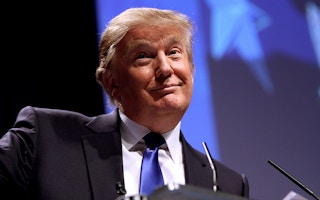Grim-faced activists at U.N. climate negotiations in Morocco pledged on Wednesday that the election of Republican Donald Trump as U.S. president would not derail global action to curb climate change and deal with its worsening consequences.
“It’s clear Donald Trump is about to be one of the most powerful people in the world… but even he does not have the power to bend and change the laws of physics,” said Alden Meyer, policy director for the Union of Concerned Scientists.
As climate change exacerbates extreme weather and other problems including sea-level rise, Trump will have an obligation to protect U.S. citizens, activists say, and could miss key opportunities to create the millions of new jobs he has promised, if the country backs off renewable energy expansion.
“Droughts, flooding and other types of extreme weather events are becoming stronger and more frequent, and the United States is not immune,” said Kelly Stone, a policy analyst for the charity ActionAid. “This is a global crisis that President-elect Trump will have to address.”
With joint action on climate change having helped build stronger and more positive relationships with countries like China, Trump also faces undermining his international power on issues from trade to fighting terrorism if he walks away from acting on climate change, Meyer said.
“If the United States is seen as going rogue nation on climate change, it will have implications for everything else he wants to do - and I think he will understand that,” he said of Trump.
But Trump’s solid election victory casts doubt on the level of progress that might be made at the two-week negotiations in Marrakesh, aimed at putting into practice the landmark Paris Agreement on climate change, crafted last year.
The pact came into effect last week, more than three years ahead of schedule, as the United States and around 100 other countries ratified it in advance of the Marrakesh meeting - some with an eye on Trump’s potential election.
“
Droughts, flooding and other types of extreme weather events are becoming stronger and more frequent, and the United States is not immune. This is a global crisis that President-elect Trump will have to address.
Kelly Stone, policy analyst, ActionAid
“We are confident the nations of this world gathered here in Morocco will keep focused on the work that needs to go ahead,” said Mariana Panuncio-Feldman, a climate expert with the World Wildlife Fund (WWF). In the world’s cities and communities “the momentum for climate action has never been stronger”, she said.
Li Shuo of Greenpeace China said that, regardless of what happens with the United States, other countries would push ahead with plans for action “out of their own self interest”.
“China will continue to work on climate change not because of international relations or diplomacy but out of its own very genuine domestic concerns” over air quality, water security and other issues, he said.
Funding fears
But experts warned the $3 billion the United States has pledged to the international Green Climate Fund, which aims to transform the world’s energy systems, curb emissions and help the vulnerable adapt to climate shifts, could now be at risk.
The United States has so far handed over only a sixth of that money, and a potential refusal to deliver the rest would leave a gaping hole in developing-country efforts to tackle climate change, which depend on international assistance.
“The momentum (for change) cannot be there without having enough money in the system,” said Harjeet Singh, who heads climate policy for ActionAid. If the United States backs away from its financial promises, “that will definitely create a vacuum”, he said.
Worse than that, Geoffrey Kamese of Friends of the Earth Africa warned “Africans will pay with their lives for the results of the U.S. elections” as climate impacts strengthen.
A more measured President?
Meyer said Trump’s conciliatory acceptance speech raised hopes that the fiery campaigner who has vowed to pull the United States out of the Paris Agreement might prove “more measured and responsible” once in office.
“I hold out hope, as a person of faith, that he can grow into this job and be a different president than he was a candidate,” Meyer said.
Under the rules of the new climate deal, Trump would not be able to withdraw the United States for at least four years, Meyer and other experts at the U.N. talks said.
More importantly, a strengthening U.S. drive toward renewable energy and other action on climate change by states, cities and companies “will continue regardless of what a U.S. President Trump does”, Meyer said.
Still, some at the negotiations expressed fears that the goal agreed in Paris last year of holding global temperature rise to “well below” 2 degrees Celsius, and potentially to an ambitious 1.5 degrees Celsius, could now be unachievable if Trump’s election chills momentum for action on climate change.
“I do not think this is dead,” said Panuncio-Feldman of WWF. But “the window of opportunity is indeed short and we are all very worried about that.”
Hans Joachim Schellnhuber, director of the Potsdam Institute for Climate Impact Research, said the world “cannot expect any positive climate action” from Trump, and must now “move forward without the United States on the road towards climate-risk mitigation and clean-technology innovation”.
Mohamed Adow, who leads on climate issues for development charity Christian Aid, said “the rest of the world will not risk a global climate catastrophe because of one man’s opposition”.
This story was published with permission from Thomson Reuters Foundation, the charitable arm of Thomson Reuters, that covers humanitarian news, climate change, women’s rights, trafficking and property rights. Visit http://news.trust.org/climate.










